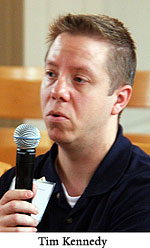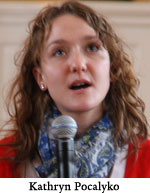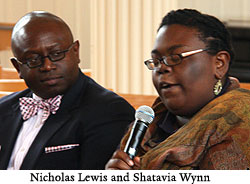Amidst a busy Convocation 2012 schedule of reunions and keynote lectures, alumni gathered in Marquand Chapel to hear current students discuss what YDS is like today. Moderating the discussion was William Goettler, associate dean of assessment and ministerial studies, who prompted the panel to reflect on what brought them to YDS and what have been the most meaningful parts of their experience on campus.
 First to respond was Berkley Divinity School student Tim Kennedy ‘14 M.Div. A self-described “practical guy,” Kennedy’s most meaningful experiences at YDS have been opportunities to balance courses like medieval theology with “practical, hands-on stuff,” like his time as an intern hospital chaplain this past summer. “I went from reading books all day to working with patients all day—two very different skills,” said Kennedy, “but I think YDS puts an emphasis on both. It’s the heart and the mind.”
First to respond was Berkley Divinity School student Tim Kennedy ‘14 M.Div. A self-described “practical guy,” Kennedy’s most meaningful experiences at YDS have been opportunities to balance courses like medieval theology with “practical, hands-on stuff,” like his time as an intern hospital chaplain this past summer. “I went from reading books all day to working with patients all day—two very different skills,” said Kennedy, “but I think YDS puts an emphasis on both. It’s the heart and the mind.”
Kathryn Pocalyko ‘13 M.Div., enrolled through the Institute of Sacred Music, explained that she is pursuing a call to pastoral ministry with the Evangelical Lutheran Church in America and chose YDS because she wanted her theological training to engage both her own commitment to being Lutheran in an ecumenical, interfaith setting and also her passion for music and literature. “I didn’t want to leave those things behind,” she said, “I wanted to find a way to incorporate them into my Masters of Divinity and into my ministry preparation.”
After 15 years with the Richmond Symphony, Nicholas Lewis ‘13 M.Div., also enrolled through the ISM, came to YDS to study how music, church, and community can “bring people together across lines of perceived difference.” And for Lewis, YDS has been a “rich and full” experience: “It’s not lost on me the monumental divide that exists largely between Yale as an institution and New Haven as the city in which it resides,” he explained, “and so I’ve been able to engage in classes in theology and ethics that are absolutely speaking to how we process all of what we see around us.”
 Steeped in both black feminist theory and the southern black church, Shatavia Wynn ‘13 M.A.R. came to YDS to begin “thinking through issues of black womanhood from a religious context.” For Wynn, YDS in 2012 is best described through the conversations on campus about race, inclusion, and “getting off the hill” and into the New Haven community. “The conversations going on around the divinity school are definitely around how we can be active and present in this space,” reflected Wynn. “We’re in a space to learn how to preach and teach to the world, but we need to learn how to teach and preach at home first. And for us who are here for two or three years, New Haven is our home.”
Steeped in both black feminist theory and the southern black church, Shatavia Wynn ‘13 M.A.R. came to YDS to begin “thinking through issues of black womanhood from a religious context.” For Wynn, YDS in 2012 is best described through the conversations on campus about race, inclusion, and “getting off the hill” and into the New Haven community. “The conversations going on around the divinity school are definitely around how we can be active and present in this space,” reflected Wynn. “We’re in a space to learn how to preach and teach to the world, but we need to learn how to teach and preach at home first. And for us who are here for two or three years, New Haven is our home.”
In the last ten minutes of the presentation, the panelists responded to questions from the audience, including a particularly poignant question about how YDS’s theological priorities will change in the future. Likening YDS to a tree that is “rooted but with branches that are constantly expanding,” Pocalyko responded, s”YDS will need to consider—as the Church as a whole will need to consider—where ministry is headed from here. The question of what YDS’s priorities will be should hopefully reflect the ways the models of church we traditionally have are changing and the way society is changing. I can’t quite say what those priorities will be, but I think they will mirror the church.”
 Alumni, and in some cases alumni spouses, seemed to agree. “People who were in my husband’s class 50 years ago mostly went into the ministry,” commented Mary Beth Koehler, wife of David Koehler ‘62 B.D., after the conclusion of the panel, “But as the panelists said, I know this isn’t possible today; there aren’t as many positions.” Yet she is optimistic about both the Church and the nature of theological education in the future: “I happen to feel that this is not a bad thing. The church is really having to change and so do our divinity schools. You can’t just spend your life thinking about Kierkegaard.”
Alumni, and in some cases alumni spouses, seemed to agree. “People who were in my husband’s class 50 years ago mostly went into the ministry,” commented Mary Beth Koehler, wife of David Koehler ‘62 B.D., after the conclusion of the panel, “But as the panelists said, I know this isn’t possible today; there aren’t as many positions.” Yet she is optimistic about both the Church and the nature of theological education in the future: “I happen to feel that this is not a bad thing. The church is really having to change and so do our divinity schools. You can’t just spend your life thinking about Kierkegaard.”
| Attachment | Size |
|---|---|
| 4.48 KB |